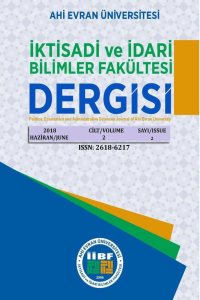Öz
The
concept of culture industry that used as a key concept. Cities gain “meta
presence” in the culture industry by restructuring their identities that they
have. The current strategy of urbanization policy is to make industrial
production tool by making the culture obsolete. So urban transformation
projects are one of the important tools of identity production to raise up the
economic and social power of the cities, today. This text revealing, the
cities' cultural and spatial values, encountered problems at the urban identity
design process. This is the phenomena of the power of politics.
While
globalization attaches importance to the nature of the space that produces
social relations, it still acts within rational modernity (structuralist
thought), which perceives time as homogeneous. Because capitalism tends to be
"destruction of the process over the time". This attitude continued
until it has realized that globalization could not be experience in the same
way in every society.
Today,
community-specific cultural practices restructured with 'market-focused' norm
production. This development stems from the fact that new culture and identity
policies play an active role in the global economy. In this process,
multinational corporations disintegrated the autonomous spheres of nation
states. In doing so, they also supported the masses by highlighting their micro
identity and belonging.
The
logic of capitalist perception and fiction is 'structural'.
"Structuralism" separates (by bringing into account information on a
measurable value) the factors in the "spatial" and "social"
differentiation that determine the cultural diversity. The society studies in
the logic of Cartesian thought. According to this logic, the market is a
structured field of social acts. "Cultural industries" are also the
structural components of the market in this context.
This study examines the urban transformation studies
in the context of the culture industry, capital and city and urban
transformation in the context of the policies to create the culture industry.
Anahtar Kelimeler
Culture Industry Globalization Modernity Urbanization Identity Policies
Kaynakça
- Adorno T., 2016, (pp.109-121), Kültür Endüstrisi Kültür Yönetimi, İletişim Yayınları,
- Balaban Osman. Capital accumulation, the state and the production of built environment: the case of Turkey, ODTÜ Şehir ve Bölge Planlama Bölümü, Yayımlanmamış Doktora Tezi, Ankara. 2008
- Buck N., Gordon I., der.(2005) Changing Cities; Rethinking Urban, Competitiveness, Cohesion and Governance, Palgrave McMillan, NewYork, sy:145
- Çelik Ş.A. ‘Kültür Endüstrisi’, s.319, Literatür Yayıncılık, 2012
- Florida R., “Cities and the Creative Class”, p:6, 2005, https://onlinelibrary.wiley.com/doi/epdf/10.1111/1540-6040.00034 , 20.10.2018
- Geniş Ş., ‘Küreselleşme, Kent ve Kültür’, İdea Kent, sayı:3, Mayıs 2011, s.48-61
- Gibson, C. ve Kong, L. (2005). Cultural economy: a critical review, Progress in Human Geography 29, 5, 541–561.
- Gottdiener, M. (1993). A Marx for our time: Henri Lefebvre and the production of space. Sociological Theory - A Journal of the American Sociological Association, 11(1), 129-134.
- Gottdiener, M. (1994). The Social Production of Urban Space, Austin: The University of Texas Press
- Güzey, Ö. ( 2012). “ Türkiye’de Kentsel Dönüşüm Uygulamaları: Neo-liberal Kent Politikaları, Yeni Kentsel Aktörler ve Gecekondu Alanları”, İdealkent Araştırma Dergisi, 7, 64-83
- Hannerz U. (1990) Cosmopolitans and Locals in World Culture, Theory, Culture & Society, Sage Jurnals, London, 237-251.
- Harvey, D. (1982). The limits to capital. Oxford: Blackwell.
- Harvey, D. (1985). The urbanisation of capital. Baltimore: Johns Hopkins University Press.
- Harvey, D. (1997). Postmodernliğin durumu. İstanbul: Metis.
- Harvey, D. (2012). Sermayenin Mekânları-Eleştirel Bir Coğrafyaya Doğru, İstanbul: Sel Yayıncılık, pp: 419.
- Harvey, D. 1989. From Managerialism to Entreprenurialism: The Transformation of Urban Governance in Late Capitalism, Geographiska Annaler B 71 (1), ss. 3-18, 1990. The Condition of Postmodernity: An Enquiry into the Origins of Cultural Change. London: Blackwell.
- İçli G., “Kentsel Yapili Çevrenin Üretimi Ve Yeni Mekansal Dinamikler - Kentsel Dönüşüm Üzerine Sosyolojik Bir Değerlendirme”, Sosyal ve Beşeri Bilimler Dergisi, Cilt 5, No 1, p:248, 2013 Issn:1309-8012 (Online)
- Jessop, B. 1997. The Entrepreneurial City, N. Jewson ve S. MacGregor (der.) Transforming Cities: Contested Governance and New Spatial Divisions, London and New York: Routledge.
- Katerji S., Ozakça M, 2015, ‘Urban Transformation as a Process for Inner-City Slums in Turkey, The Experience of Gaziantep City, Turkey’, Artium Journal, Cilt 3, Sayı 2, pp:22-36, Hasan Kalyoncu Üniversitesi Güzel Sanatlar ve Mimarlık Fakültesi Publication, Gaziantep, Turkey (http://dergipark.gov.tr/download/article-file/25552)
- Kelly. 1998.New Rules for the New Economy. New York: Viking
- Lefebvre, H. (1976). Survival of capitalism. Londra: Macmillan.
- Lefebvre, H. (1979). Space: Social product and use value. J. Freiberg (Ed.), Critical sociology: European Perspective. NewYork: Grossman.
- Lefebvre H. (1991), Production of Space, Oxford, OX, UK ; Cambridge, Mass., USA Blackwell, pp: 352-353
- Lefebvre, H. (2014), Mekânın Üretimi (Çev. Işık Ergüden), Sel Yayıncılık, İstanbul
- Power, D. ve Scott, A.J. (2004). A Prelude to Cultural Industries and the Production of Culture, D. Power ve A.J. Scott (der.) Cultural Industries and the Production of Culture (ss. 3-15) içinde. London and New York: Routledge.
- Roberts, P. (2000). The Evolution, Definition and Purpose of Urban Regeneration, in Urban Regeneration. Thousand Oaks- Sage Publications, New Delhi.
- Rober ts, P. , 2000. The evolution, definition and purpose of urban regeneration. P. Roberts ve H. Sykes, (Ed.), Urban regeneration a handbook .London: SAGE Publications.
- Scott, A.J. (2004). Cultural Products Industries and Urban Economic Development, Urban Affairs Review, 461-490., http://129.3.20.41/eps/urb/papers/ 0511/0511005.pdf, [erişim 25 Ekim 2016].
- Swingewood A., 1998, s.310, ‘Sosyolojik Düşüncenin Kısa Tarihi’, Bilim ve Sanat Yayınları, Ankara
- Tekeli İ, (2010), Sanayi Toplumu İçin Sanayi Yazıları, Tarih Vakfı Yurt Yayınları, İstanbul
- Töre E., “Any Room for Cultural Industries in Urban Policies?: The case of Istanbul Film Industry”, İdeal Kent, Sayı 12, Nisan 2014, ss. 160-193)
- Tural, N. K (2004). Küreselleşme ve Üniversiteler, Ankara: Kök Yayıncılık.
Ayrıntılar
| Birincil Dil | İngilizce |
|---|---|
| Konular | Siyaset Bilimi |
| Bölüm | Makaleler |
| Yazarlar | |
| Yayımlanma Tarihi | 30 Aralık 2018 |
| Yayımlandığı Sayı | Yıl 2018 Cilt: 2 Sayı: 2 |


